Strumming Through Time: Exploring the Heart and Soul of Folk Music Festivals
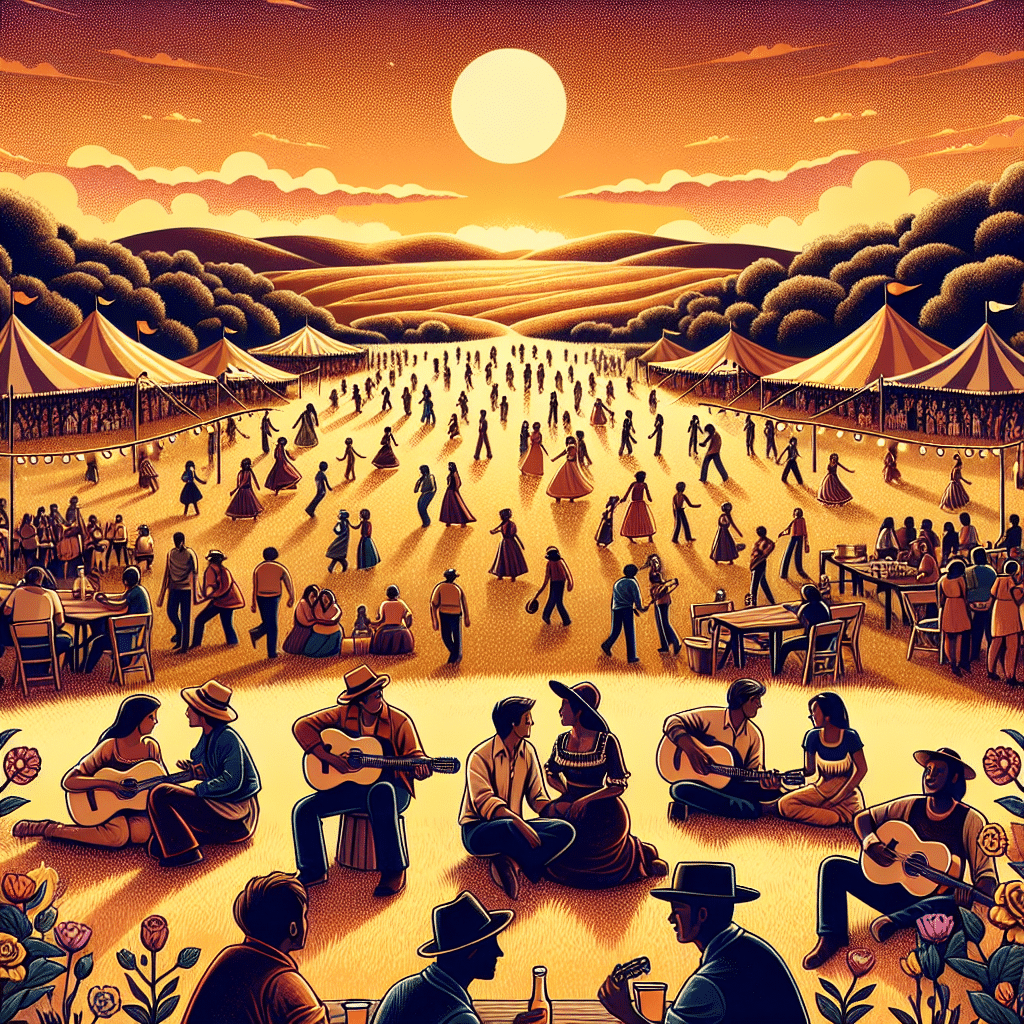
Folk music has a rich, storied history that reflects the deep connections between communities, stories, and traditions. Festivals dedicated to this genre serve as a heartfelt celebration of these connections, uniting artists and audiences in a shared appreciation for the roots of music. "Strumming Through Time" captures the essence of folk music festivals which are often an echo of past generations, preserving and revitalizing folk traditions while also serving as a space for innovation and creativity.
The Roots of Folk Music
Folk music is not just a genre; it's a tapestry woven from the threads of history, culture, and personal expression. Emerging from the oral traditions of storytelling, folk music has always been a way for communities to share their narratives, celebrate shared experiences, and voice their struggles and victories. From Appalachian ballads to Celtic jigs, folk music encapsulates the heartbeats of different cultures, passing down wisdom and emotion through melodies.
Festivals dedicated to folk music play a critical role in maintaining this rich heritage. They serve as living museums, where each strum of the guitar, each beat of the drum, and each vocal harmony evokes the timelessness of human experience. In these gatherings, musicians—both seasoned veterans and budding talent—come together to ensure that the stories told by their ancestors continue to resonate in contemporary society.
See Also: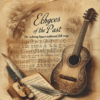 “Echoes of the Past: The Enduring Legacy of Traditional Folk Songs”
“Echoes of the Past: The Enduring Legacy of Traditional Folk Songs”The Atmosphere of Folk Music Festivals
Walking into a folk music festival is like stepping into a vibrant community where the air is filled with laughter, music, and camaraderie. Often held outdoors in parks, fields, or forests, these festivals celebrate not only music but also the cultural values of inclusivity, connection, and communal support.
Community and Connection
The beauty of folk music festivals lies in their ability to foster a sense of belonging. Attendees engage with one another, sharing stories and experiences while listening to musicians from diverse backgrounds. The festival atmosphere encourages collaboration—not just between musicians on stage but among audience members as well.
See Also: Strumming Back to Roots: The Resurgence of Folk Music in Today's Soundscape
Strumming Back to Roots: The Resurgence of Folk Music in Today's SoundscapeThe heart of these festivals beats stronger in the moments when strangers become friends, united by the music. Workshops, jam sessions, and open mics create opportunities for spontaneous musical collaborations, showcasing the genre's improvisational roots and inviting participation from all who are willing to share their voice.
Diversity of Performances
Folk music festivals are a showcase of diversity. They often include a range of artists, featuring everything from traditional folk musicians playing instruments like the banjo and fiddle to modern interpretations that blend folk with rock, blues, and pop influences. This eclectic mix not only attracts various audiences but also enriches the festival experience, offering attendees a chance to witness the evolution of folk music while honoring its timeless origins.
Embracing Innovation in Tradition
While folk music festivals celebrate tradition, they are also spaces for innovation. Many contemporary folk artists take inspiration from the past while experimenting with new sounds and styles. This melding of old and new can lead to fresh, vibrant music that resonates with audiences.
See Also: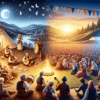 From Campfires to Concerts: The Enduring Charm of Folk Music Festivals
From Campfires to Concerts: The Enduring Charm of Folk Music FestivalsWorkshops and Skill-sharing
Workshops at folk festivals are often a highlight, offering attendees a chance to learn from accomplished musicians. These sessions not only teach attendees how to play instruments or understand songwriting but also provide insight into the cultural contexts from which these musical traditions arise. Here, attendees explore different genres, instruments, and techniques, fostering creativity and sparking new ideas. This environment encourages the reimagining of traditional songs, leading to unique interpretations that honor the past while forging new paths forward.
Sustainability and Inclusivity
Many folk festivals are increasingly attentive to issues of sustainability and inclusivity. Organizers often prioritize eco-friendly practices, such as waste management and local sourcing of food and supplies. Additionally, festivals are working to accommodate diverse voices in folk music, ensuring that marginalized communities are represented on stage and in the audience.
See Also: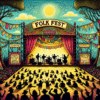 Folk Fest Favorites: Top Artists to Catch at This Year’s Celebrations
Folk Fest Favorites: Top Artists to Catch at This Year’s CelebrationsThese efforts elevate the importance of folk music as a vehicle for social change, spotlighting issues like gender equality, racial justice, and environmental consciousness. By creating a platform for dialogue and showcasing a wide range of perspectives, folk festivals can inspire positive change both within and beyond the musical community.
Conclusion: The Importance of Folk Music Festivals
Folk music festivals serve as vital cultural touchstones that connect us to our past while illuminating pathways for the future. They are not just concerts; they are celebrations of heritage, community, and the enduring nature of storytelling through music. Through participation in these festivals, individuals can experience the resonance of tradition, the joy of connection, and the thrill of creativity.
As we march through time, these festivals hold significant cultural and social importance. They keep the spirit of folk music alive, ensuring that our stories continue to be shared, our traditions preserved, and our connections deepened. In this sense, "Strumming Through Time" is at once a tribute to the past and an exploration of the possibilities that lie ahead, as musicians and audiences alike weave new narratives into the fabric of folk music.
See Also: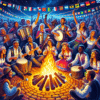 Gather 'Round the Fire: The Cultural Impact of Folk Music Festivals
Gather 'Round the Fire: The Cultural Impact of Folk Music FestivalsFAQs
1. What is the history of folk music?
Folk music has roots in the oral traditions of storytelling, often passed from generation to generation. It reflects the cultural and social experiences of various communities and has evolved into numerous subgenres over time.
2. What can I expect at a folk music festival?
At a folk music festival, you can expect live performances from various artists, workshops and jam sessions, food vendors, and a vibrant atmosphere that encourages community engagement and participation.
See Also: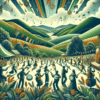 Harmony in the Hills: A Guide to the Best Folk Music Festivals of 2023
Harmony in the Hills: A Guide to the Best Folk Music Festivals of 20233. Are folk music festivals family-friendly?
Many folk music festivals are designed to be family-friendly, featuring activities and areas specifically for children, as well as a welcoming environment that encourages all ages to participate.
4. How can I get involved in folk music?
You can get involved in folk music by attending festivals, participating in workshops, joining local music groups, or simply picking up an instrument and exploring the genre yourself.
5. What role do folk festivals play in social change?
See Also: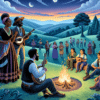 Harmony in the Hills: Exploring the Modern Folk Music Renaissance
Harmony in the Hills: Exploring the Modern Folk Music RenaissanceFolk festivals often provide a platform for marginalized voices, advocating for social issues such as gender equality and racial justice. They promote inclusivity and raise awareness around important topics through performance and dialogue.
If you want to know other articles similar to Strumming Through Time: Exploring the Heart and Soul of Folk Music Festivals you can visit the category Folk.
